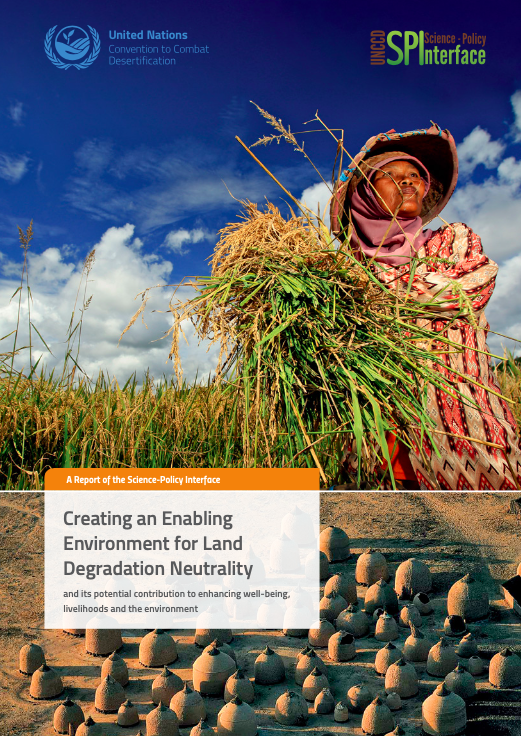Location
The United Nations Convention to Combat Desertification in Those Countries Experiencing Serious Drought and/or Desertification, Particularly in Africa (UNCCD) is a Convention to combat desertification and mitigate the effects of drought through national action programs that incorporate long-term strategies supported by international cooperation and partnership arrangements.
Members:
Resources
Displaying 146 - 150 of 585Creating an Enabling Environment for Land Degradation Neutrality and its potential contribution to enhancing well-being, livelihoods and the environment
The Sustainable Development Goals (SDGs) adopted by the United Nations General Assembly in September 2015 include a target on land degradation neutrality (LDN) (SDG 15.3). Attaining and maintaining LDN requires addressing a land governance challenge to steer land management towards avoiding, reducing and reversing land degradation.
Land Degradation Neutrality (LDN) Fund. An innovative impact investment fund for sustainable land use, with a linked TA Facility
The challenge of land degradation Sustainable land use is closely connected with many sustainable development objectives Land Degradation Neutrality (LDN). It is estimated that two billion hectares of land is degraded worldwide, and we continue to degrade another 12 million hectares of productive land every year. According to the 2018 World Atlas of Desertification produced by the European Commission’s Joint Research Centre, 75% of the Earth’s land area is already degraded, and over 90% could become degraded by 2050.
Combining Earth Observations, Cloud Computing, and Expert Knowledge to Inform National Level Degradation Assessments in Support of the 2030 Development Agenda
Monitoring progress towards the 2030 Development Agenda requires the combination of traditional and new data sources in innovative workflows to maximize the generation of relevant information. We present the results of a participatory and data-driven land degradation assessment process at a national scale, which includes use of earth observation (EO) data, cloud computing, and expert knowledge for Argentina.
Land in numbers 2019. Risks and opportunities.
Numbers can tell a compelling story. In this brochure, the numbers highlight how much we rely on productive land. Amongst other valuable services, land feeds our families, provides fresh water and powers our future ambitions. Much of the data collected here, however, demonstrate how close we are to pushing our relationship with the land to breaking point. The magnitude of the challenges and potential consequences of failing to implement bold action on land and soil, in terms of future social stability and economic development, should not be underestimated.
Land Degradation Neutrality in Small Island Developing States
Land degradation exacerbates the unique vulnerabilities of Small Island Developing States (SIDS) to environmental challenges, such as climate change, flash floods, soil erosion, lagoon siltation, coastal erosion and sea level rise, undermining their economic potential. Land Degradation Neutrality (LDN) contributes to achieving the Sustainable Development Goals (SDGs) in SIDS, preserving biodiversity and increasing resilience to climate change. Land degradation has a strong negative impact on climate-sensitive sectors like agriculture, water resources management and coastal zone management.



